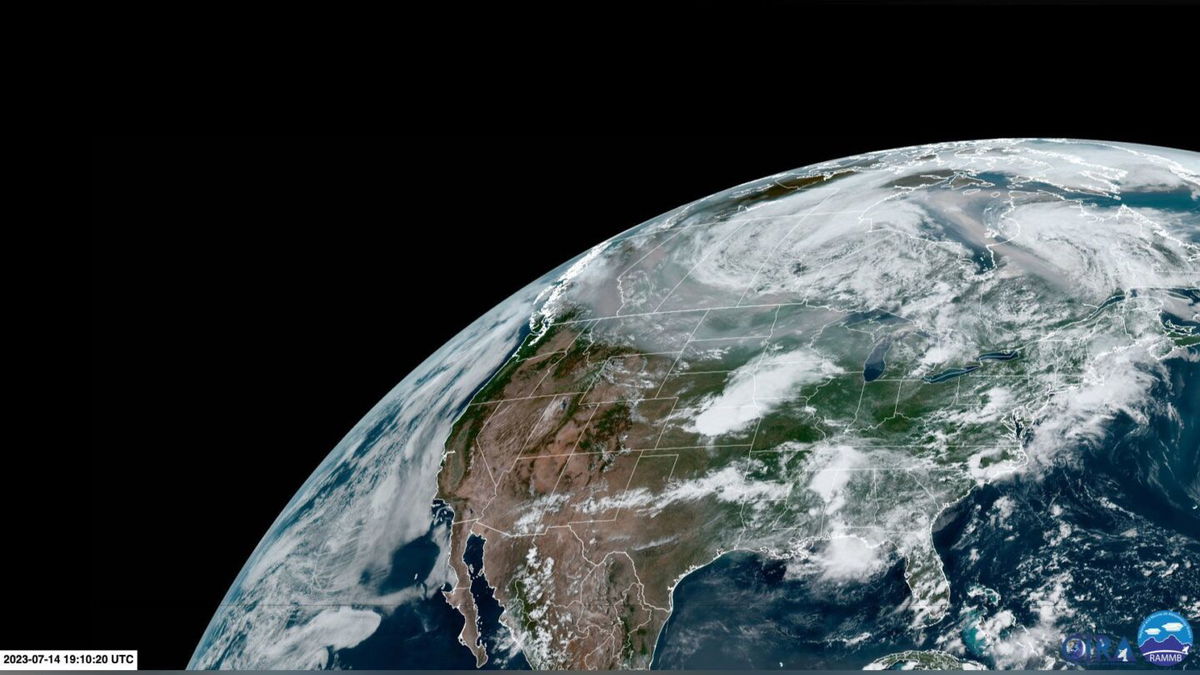A new outbreak of Canadian wildfires is sending a plume of unhealthy smoke into the US yet again

A satellite image of North America
by Eric Zerkel, CNN
(CNN) — A recent outbreak of wildfires in western Canada is again sending a plume of unhealthy smoke into the United States.
Air quality alerts were in effect Saturday for at least eight states across the northern Plains and upper Midwest as smoke from the wildfires returns.
Smoke will be heaviest across parts of Montana, the Dakotas, Minnesota and Iowa on Saturday before shifting southeastward later in the weekend. Minneapolis and Des Moines, Iowa, will see the worst of the smoke Saturday while cities such as Chicago, St. Louis, Detroit, and Cincinnati will begin to see the effects on Sunday.
The Midwest will continue to see poor air quality and decreased visibility into early next week as the smoke lingers.
Chicago experienced some of the worst air quality in the world amid heavy smoke in late-June.
This time, the smoke plume is not coming from the Canadian province of Quebec. It is instead funneling across Canada from much further away in the West, so it shouldn’t reach the Northeast like it did in early June, when New York City’s skies turned an apocalyptic shade of orange.
On Friday, the encroaching smoke dropped air quality in parts of Montana and North Dakota to code red, or unhealthy levels on the Air Quality Index, and to code orange, or unhealthy for sensitive groups, in Minnesota, according to airnow.gov.
Wildfire smoke contains tiny pollutants known as particle matter, or PM 2.5, that can get into the lungs and bloodstream once inhaled. These pollutants most commonly cause difficulty breathing and eye and throat irritation, but have also been linked to more serious long-term health issues like lung cancer, according to the Centers for Disease Control and Prevention.
The plume was birthed from nearly 400 fires sparked in Canada’s province of British Columbia in the past week, nearly half of which were started by 51,000 lightning strikes from thunderstorms, the BC Wildfire Service said. Some of those thunderstorms were “dry” or produced inconsequential amounts of rain to help squelch any fires, a dangerous prospect in a province experiencing the worst level of drought.
Parts of the US will be at risk of smoke for the foreseeable future depending on weather patterns and fire flareups because Canada is experiencing its worst fire season on record. More than 24 million acres have burned so far this year, an area roughly the size of Indiana.
British Columbia has had more than 1,000 fires start since April. Those fires have already burned through nearly three times the amount of land compared to an average year in British Columbia over the last 10 years, the BC Wildfire Service said.
One firefighter died Thursday responding to one of the blazes near Revelstoke, British Columbia, a press release from the firefighter’s union said. The BC Wildfire Service confirmed the death to CNN. The firefighter has not been identified.
Prime Minister Justin Trudeau eulogized the firefighter on Twitter Friday.
“The news from British Columbia – that one of the firefighters bravely battling wildfires has lost her life – is heartbreaking,” Trudeau said. “At this incredibly difficult time, I’m sending my deepest condolences to her family, her friends, and her fellow firefighters.”
The-CNN-Wire
™ & © 2023 Cable News Network, Inc., a Warner Bros. Discovery Company. All rights reserved.